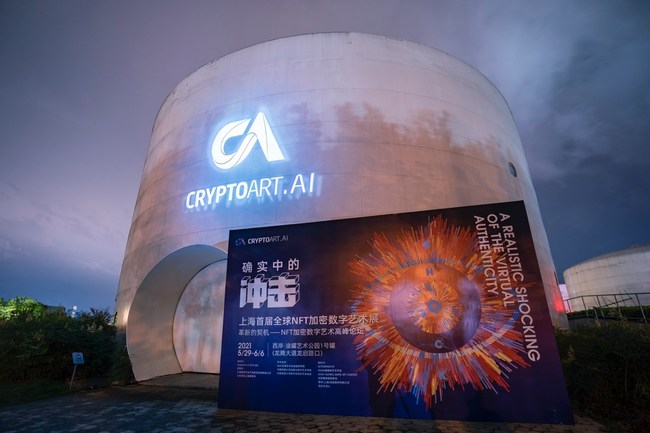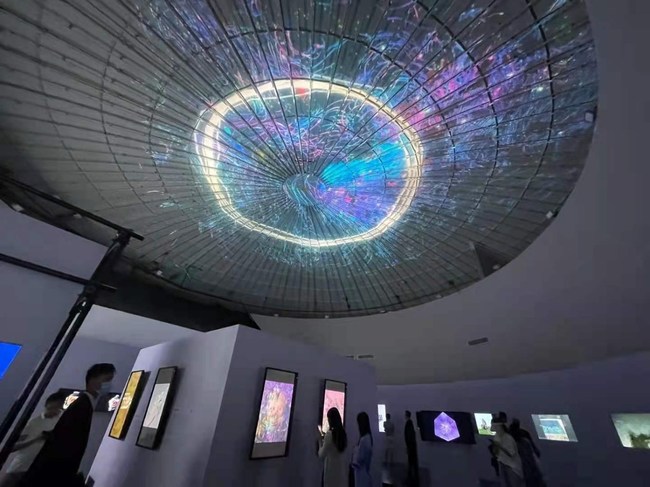SHANGHAI, June 17, 2021 /PRNewswire/ — "When Nothing surfaces in signs, when Nothingness emerges at the very heart of the sign system, that is the fundamental event of art. The poetic operation is to make Nothingness rises from the power of signs – not banality or indifference towards reality but radical illusion."
—- The Conspiracy of Art, 1996, Jean Baudrillard
In the exhibition A Realistic Shocking of the Virtual Authenticity, we could notice the growing vividity of how capable the digital art can become. When the images created by virtual space is becoming more and more ‘real’ and vibrant, when their authenticity has been transferred to the cyberspace, when the ubiquity of daily life is being transferred into the ‘online community’, we might feel a bit of anxious and worried, but more likely, we dive into the sensual realm and befuddled in the stimulations.
In Baudrillard’s Simulacra and Simulation (1994), in the third-order of simulacra, the simulated is more real than ‘the real’, thus, ‘the real’ is at the mercy of the simulated.
NASA Data Gate by Ouchhh delivered a similar concept. By collaborating with NASA, the art collective Ouchhh obtained a massive amount of cosmological data which collected by NASA. When Ouchhh reorganise and reconfigured the data and applied artificial intelligence to run it. The ‘translation’ is realised by machine learning, and presented a simulated universe trapped inside of a cube. "Can you fit in the whole universe in a simple cube?" was the question that Ouchhh asked. Kepler’s data is continuously being updated, so will one day, the collected data of the observable universe fit into the cube?
In Aimo Yang’s digital performance Consciousness Anti-body 2021, he used 6 HD projectors to project synchronised images onto the dome. The action of ‘looking up’ and the overwhelming sensation offered an a priori experience. Yang used live-generated images to provide the audience a long-gone sublime. Underneath the dome are improv dancing and jazz music jam session. The dancers are metaphorically leaping into the computer binary universe, continue living as digital avatars.
When one digital artwork has been converted to NFT, its value of exchange has been generated by using crypto technology, but its use value is almost annihilated in the physical world. The annihilation is devouring the authenticity, physicality, real-life production, modernity, and instinct. Our organism bodies are still living in the real world, but in the society consists of ‘bodies’, everything turned into simulacra.
The exhibition is organised by CryptoArt.Ai, was the first global scale NFT cryptoart exhibition held in Shanghai, and opened at May 29 2021. It caused phenomenal effect on the opening day, as NFT broke into the mainstream in the beginning of the year with controversies and discussions. Due to the COVID-19 pandemic, there hasn’t been a holistic and art history-based digital art exhibition globally.
Curator Du Xiyun and Qin Jianxin studied from the history of digital art, dated back the origin of digital art to 1948, when Norber Wiener published his Cybernetics: Or Control and Communication in the Animal and the Machine. When it extended its significance to the art world, it reflected as how human make influence on apparatus, or vice versa, we could trace back the earliest experiment on digital art, such as Laposky’s oscillogram to CGI, and then as the internet emerged, we witnessed the internet art/post-internet art, and cryptoart based on blockchain technologies.
Curator Du Xiyun compared the shock with Robert Hugh’s book/documentary The Shock of the New. Since the beginning of impressionism, the modern/contemporary art has always been challenging the old aesthetics and discourse, we are still living inside of the aftershock. Cryptoart has an equivalent shocking value as well. It did not only shock the art medium, but most importantly, the way of art dealing and the understanding the ‘authenticity’. Cryptoart even though mostly innovative on the ‘crypto’ part now, which is the uniqueness and authenticity based on blockchain tech, but the influence will eventually impact more on the ‘art’ part of it. For the indigenous residents on the internet, they are the generation that use digital medium to create art, but with the new driven factor and momentum, digital artists will naturally push the boundaries of creativity.
Duration: 2021 May 29 – June 6
Opening: 2021 May 29 14:00
Venue: No.2380 Longteng Ave. West Bund Art Park, Tank No.1
Participated artists:
Beeple, Pak, Hackatao, Ouchhhh, Marcelo Cantu, Max Mao, Jon Noorlander, Suryanto, Jonathan Nash, Andreas, chmiel_art, marc0matic, Shindo, yellosesame, Charles Cheong, CornelSwoboda, etienecraus, Glass Grane, mbsjq, Aimo Yang, VJ Elephant, Song Ting, Wang Ke, Xin Qi
Curators: Du Xiyun, Qin Jianxin
Producers: Jin Wei, Pan Wei, Zhu Zheng
Art consultants: Wan Heng, Song Ting, Shi Ran
Exhibition organisers: Pan Chenjia, Zhi Ming
SOURCE CryptoArt.Ai



